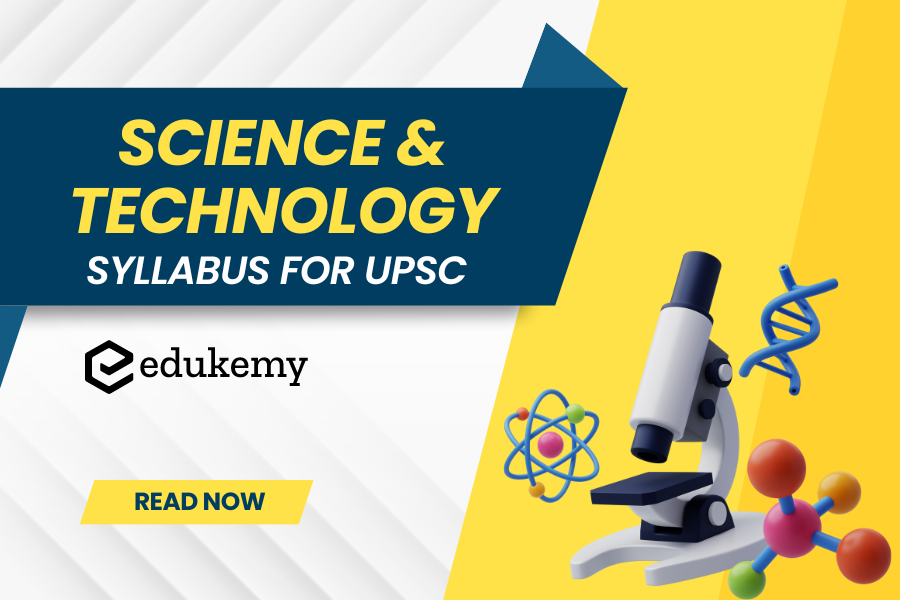
The Science and Technology syllabus for the Union Public Service Commission (UPSC) examination plays a pivotal role in assessing candidates’ understanding of contemporary developments and their implications in the rapidly evolving world of science and technology. This segment of the UPSC syllabus is designed to evaluate candidates’ scientific aptitude and awareness of the latest advancements, technological innovations, and their societal impacts. Covering a broad spectrum of topics, including space technology, biotechnology, information technology, and environmental science, the syllabus aims to test candidates’ ability to comprehend and analyze scientific and technological issues critically. As the UPSC exam seeks individuals equipped with a holistic understanding of the world, the Science and Technology syllabus underscores the significance of scientific knowledge and its application in addressing global challenges and shaping the future. Candidates are expected to demonstrate a nuanced grasp of scientific concepts, technological developments, and their ethical dimensions, thereby reflecting their readiness to contribute meaningfully to governance and policymaking in an era defined by rapid scientific and technological progress.
Contents
- 1 Science and Technology – Topics and Sub-Topics
- 2 FAQs for Science and Technology Syllabus for UPSC
- 2.1 Q: What is the significance of science and technology in the context of UPSC exams?
- 2.2 Q: What are the key topics covered under the Science and Technology syllabus for UPSC?
- 2.3 Q: How can I prepare effectively for the Science and Technology section of UPSC exams?
- 2.4 Q: Can you provide examples of recent technological advancements that might be relevant for UPSC exams?
- 2.5 Q: How does the Science and Technology syllabus connect with other subjects in the UPSC exam?
- 3 In case you still have your doubts, contact us on 9811333901.
Science and Technology – Topics and Sub-Topics
Certainly! Science and technology cover a wide range of topics and sub-topics. Here’s a breakdown of some major categories and their corresponding sub-topics:
Science:
- Physical Sciences:
- Physics
- Chemistry
- Astronomy
- Earth Science
- Geology
- Life Sciences:
- Biology
- Botany
- Zoology
- Genetics
- Ecology
- Environmental Science:
- Climate Change
- Conservation
- Biodiversity
- Pollution
- Mathematics:
- Pure Mathematics
- Applied Mathematics
- Statistics
- Algebra
- Calculus
- Social Sciences:
- Psychology
- Sociology
- Anthropology
- Economics
- Political Science
- Computer Science:
- Algorithms
- Artificial Intelligence
- Data Science
- Machine Learning
- Computer Networks
- Material Science:
- Nanotechnology
- Biomaterials
- Semiconductor Physics
- Metallurgy
- Medical Science:
- Medicine
- Pharmacology
- Anatomy
- Immunology
- Neuroscience
Technology:
- Information Technology:
- Software Development
- Cybersecurity
- Web Development
- Database Management
- Communication Technology:
- Telecommunications
- Networking
- Wireless Technology
- Internet of Things (IoT)
- Energy Technology:
- Renewable Energy
- Energy Storage
- Nuclear Energy
- Fossil Fuels
- Transportation Technology:
- Automotive Technology
- Aerospace Technology
- Public Transportation
- Autonomous Vehicles
- Biotechnology:
- Genetic Engineering
- Biomedical Technology
- Bioinformatics
- Cloning
- Robotics:
- Industrial Robotics
- Service Robotics
- Humanoid Robots
- Robotic Process Automation (RPA)
- Space Technology:
- Satellite Technology
- Space Exploration
- Spacecraft Design
- Astrophysics
- Medical Technology:
- Medical Imaging
- Telemedicine
- Prosthetics
- Wearable Health Devices
- Environmental Technology:
- Sustainable Design
- Waste Management
- Water Treatment
- Air Quality Monitoring
- Educational Technology:
- E-learning
- Educational Software
- Learning Management Systems
- Gamification in Education
FAQs for Science and Technology Syllabus for UPSC
Q: What is the significance of science and technology in the context of UPSC exams?
Answer: Science and technology play a crucial role in the development of nations. The UPSC recognizes the importance of staying updated with advancements in these fields to make informed policy decisions. Questions related to science and technology aim to test the candidate’s awareness of contemporary issues, technological developments, and their implications on society.
Q: What are the key topics covered under the Science and Technology syllabus for UPSC?
Answer: The Science and Technology syllabus includes topics such as space technology, biotechnology, information technology, nanotechnology, robotics, and their applications in various fields. It also covers issues related to intellectual property rights, ethical concerns, and the societal impact of technological advancements.
Q: How can I prepare effectively for the Science and Technology section of UPSC exams?
Answer: To prepare for the Science and Technology section, candidates should stay updated with current affairs, especially those related to scientific and technological developments. Reading reputable newspapers, magazines, and scientific journals can be helpful. Understanding the basic principles of key technologies and their applications is also crucial.
Q: Can you provide examples of recent technological advancements that might be relevant for UPSC exams?
Answer: Recent technological advancements could include developments in artificial intelligence, blockchain technology, space exploration missions, gene editing techniques like CRISPR-Cas9, advancements in renewable energy, and breakthroughs in medical research. Candidates should be prepared to discuss the implications of these advancements on society, economy, and governance.
Q: How does the Science and Technology syllabus connect with other subjects in the UPSC exam?
Answer: The Science and Technology syllabus is interconnected with other subjects like General Studies (GS) and Essay Paper. For instance, technological advancements may have implications on economic policies, international relations, and environmental issues. Understanding these connections is essential for holistic preparation and effective essay writing.
In case you still have your doubts, contact us on 9811333901.
For UPSC Prelims Resources, Click here
For Daily Updates and Study Material:
Join our Telegram Channel – Edukemy for IAS
- 1. Learn through Videos – here
- 2. Be Exam Ready by Practicing Daily MCQs – here
- 3. Daily Newsletter – Get all your Current Affairs Covered – here
- 4. Mains Answer Writing Practice – here

